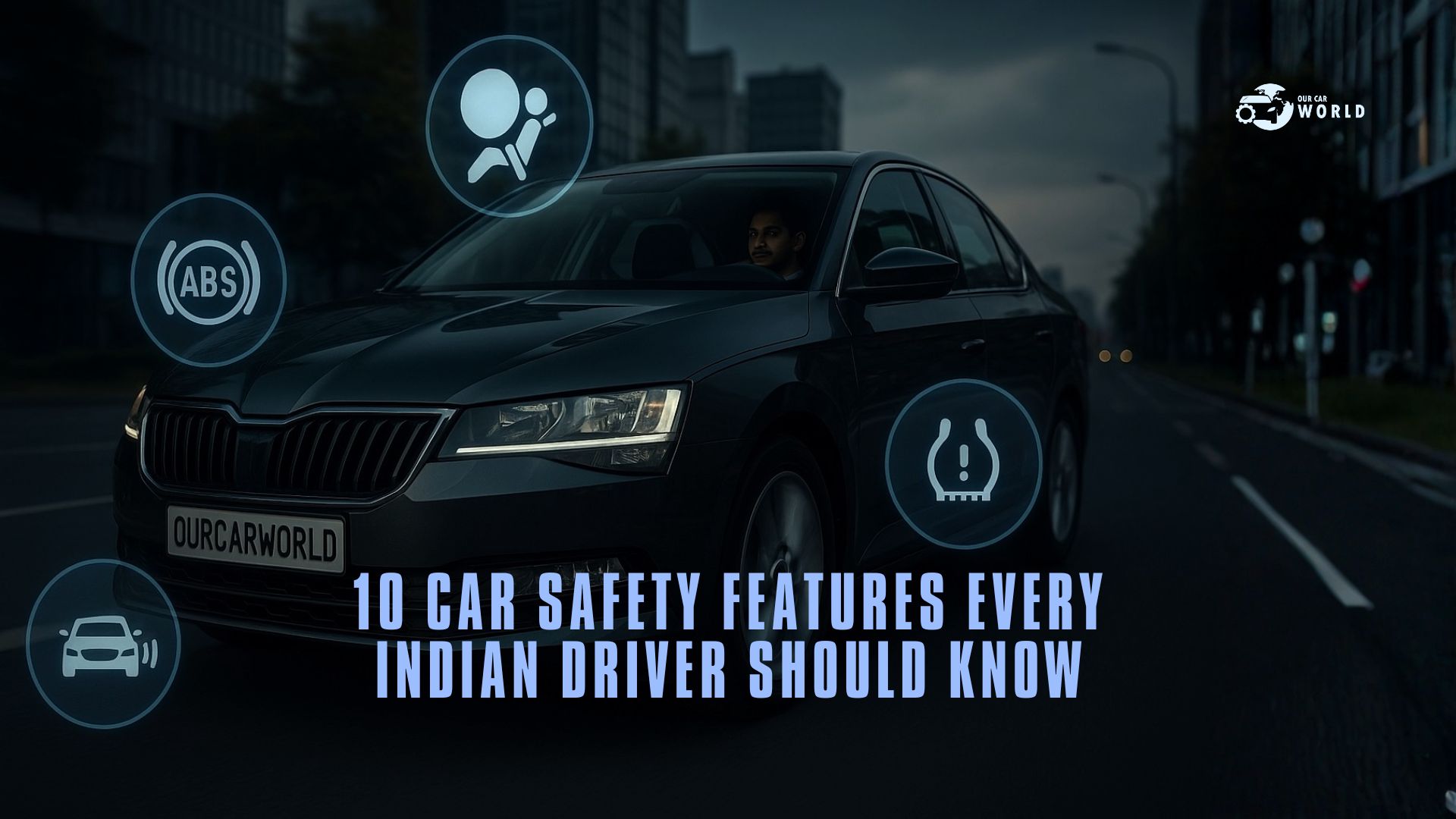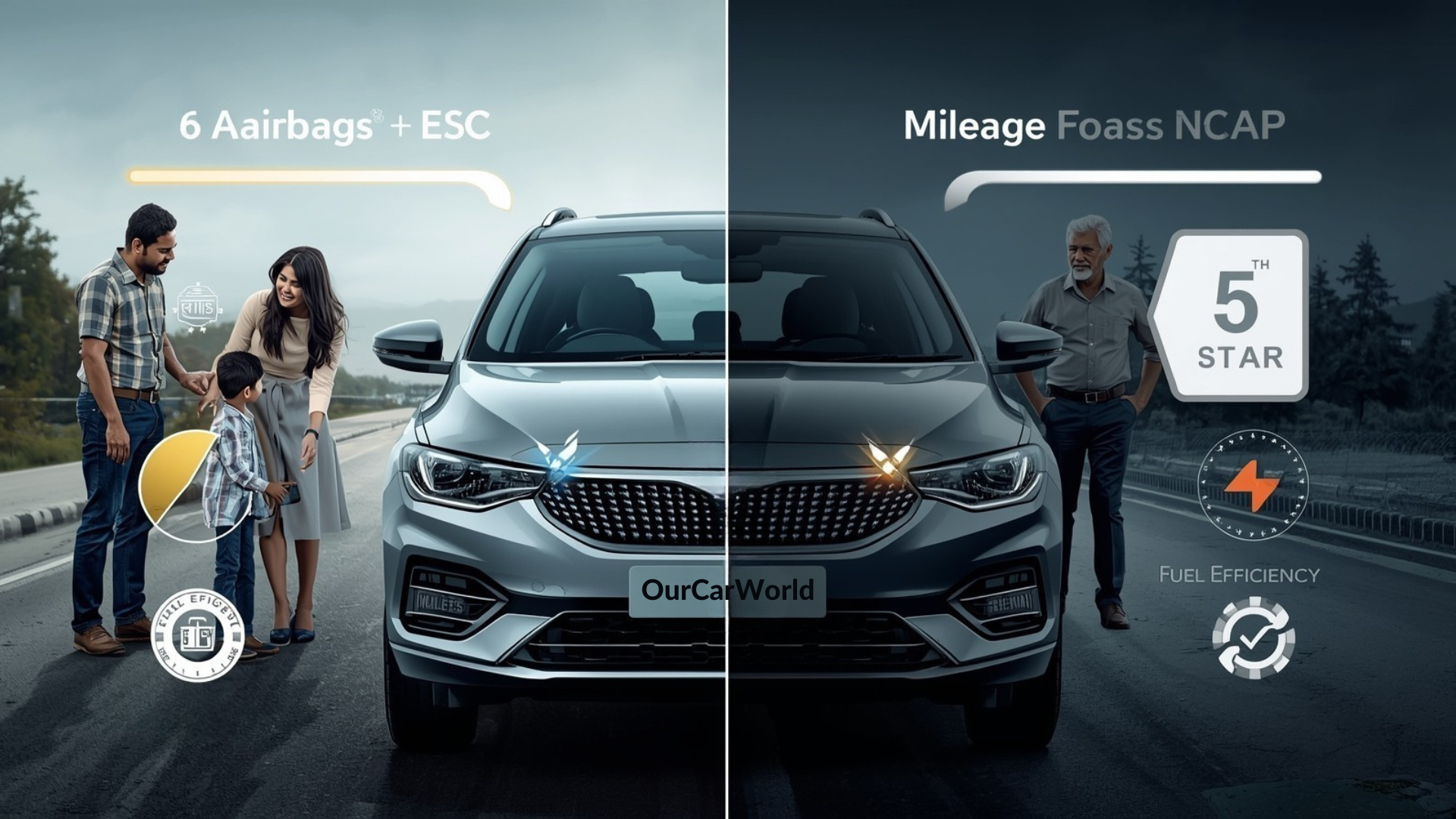Introduction
Every year, India records over four lakh road accidents – many of which could have been avoided with better driver awareness and vehicle safety. Whether you drive a small hatchback, a family sedan, or an SUV, understanding car safety features is no longer optional – it’s a necessity.
Today’s cars are equipped with advanced technologies that not only protect the driver and passengers but also reduce the chances of accidents. From ABS braking to airbags and stability control, each feature plays a unique role in ensuring safe driving in India.
Here’s a complete breakdown of the top 10 car safety features every Indian driver should know and check before buying a new car or going on a long trip.
1. Anti-lock Braking System (ABS)
The Anti-lock Braking System prevents your car’s wheels from locking during sudden braking. This gives you better steering control and helps avoid skidding – especially on wet or uneven Indian roads.
How it works:
When you apply sudden brakes, ABS automatically modulates brake pressure on each wheel, allowing controlled stops instead of uncontrolled slides.
Why it matters:
- Improves stability and steering control
- Reduces stopping distance on slippery roads
- Now mandatory in all cars sold in India since 2019
Pro Tip: You can test ABS by braking firmly on a safe, open road – you’ll feel a slight vibration under the brake pedal, confirming the system is active.
2. Airbags
Airbags are your first line of defense in the event of a crash. They inflate within milliseconds to cushion the driver and passengers from hard surfaces.
Key facts:
- Dual front airbags are now mandatory in all passenger vehicles in India.
- Many premium models also include side, curtain, and knee airbags for added safety.
- Combined with seatbelts, airbags can reduce fatal injuries by up to 60%.
Read Autocar India’s detailed guide on how airbags save lives.
3. Electronic Stability Control (ESC)
The Electronic Stability Control (ESC) helps maintain your vehicle’s balance during sharp turns or when you lose control on slippery roads.
How it helps:
- Detects when the car is about to skid
- Applies brakes automatically to specific wheels
- Keeps your vehicle aligned with your intended path
Cars equipped with ESC handle emergency maneuvers better, making it a must-have for SUVs and sedans.
Check out Top 10 Cars Under ₹10 Lakh in India for Daily City Driving – many budget cars now come with ESC as a standard feature.
4. Traction Control System (TCS)
Traction Control works in coordination with ABS and ESC to prevent wheel spin during acceleration.
Benefits:
- Improves grip on slippery or gravel roads
- Reduces tyre wear
- Enhances fuel efficiency by maintaining stable traction
Best for: Indian regions with heavy rainfall or hilly terrain.
Quick Comparison of Core Safety Systems
| Feature | Function | When It Helps Most |
|---|---|---|
| ABS | Prevents skidding during braking | Wet or slippery roads |
| ESC | Maintains vehicle balance | Sharp turns, emergency swerves |
| TCS | Prevents wheel spin during acceleration | Hilly or rainy conditions |
5. Rear Parking Sensors and Camera
With limited parking spaces in Indian cities, rear parking sensors and cameras have become a driver’s best friend.
Advantages:
- Detects obstacles behind the car
- Alerts driver with audio or visual signals
- Cameras provide clear rear visibility on the infotainment screen
Modern cars even feature 360° parking assist systems, reducing minor dents and scratches caused during tight parking maneuvers.
6. Tyre Pressure Monitoring System (TPMS)
Proper tyre pressure is critical to safe driving. A Tyre Pressure Monitoring System automatically warns you if tyre pressure drops below recommended levels.
Why it matters:
- Prevents tyre blowouts
- Improves fuel efficiency by 3–5%
- Extends tyre life significantly
Learn how TPMS contributes to safer roads at CarDekho.
7. Hill Start Assist (HSA)
Hill Start Assist prevents your car from rolling backward when starting on a slope.
How it works:
- Temporarily holds brake pressure as you switch from brake to accelerator.
- Ensures a smooth start on inclines without clutch stress.
This feature is especially useful in hilly regions like Himachal or Uttarakhand and also while parking in multi-level complexes.
8. ISOFIX Child Seat Mounts
If you travel with kids, ISOFIX mounts are essential for safety. They provide standardized anchor points for securely installing child seats.
Benefits:
- Ensures maximum stability for baby or booster seats
- Reduces injury risk during accidents
- Compatible with most global child seat brands
Why Indian families should care:
Despite legal awareness being low, child seat safety can reduce injury risk by up to 70% for young passengers.
9. Adaptive Headlights
Driving at night or through fog can be dangerous if visibility is poor. Adaptive headlights automatically adjust their angle and brightness depending on your steering direction and car speed.
Advantages:
- Provides clear visibility on curves
- Reduces glare for oncoming vehicles
- Automatically brightens dark areas ahead
This small feature can make a big difference for night-time highway driving in India.
10. Seatbelt Pretensioners and Load Limiters
Seatbelts may seem simple, but modern versions are smart.
Pretensioners tighten the belt during impact, while load limiters control the belt’s pressure to prevent chest injury.
Key Benefits:
- Minimizes movement during a collision
- Works alongside airbags for maximum protection
- Protects both driver and passengers effectively
Fun Fact: Even at low speeds, a properly worn seatbelt reduces fatality risk by 45%.
Bonus: Emergency Assistance & Connected Safety
Modern vehicles now offer emergency call systems, which automatically alert emergency services after a crash.
- Uses GPS to share vehicle location
- Some cars (like Tata and Hyundai models) come with SOS buttons
- Future EVs will include AI-based diagnostics for crash detection
These connected features will become a standard part of safe driving in India in the next few years.
Summary Table: Mandatory vs Optional Safety Features
| Safety Feature | Purpose | Mandatory in India? | Ideal For |
|---|---|---|---|
| ABS | Prevent wheel lock during braking | Yes | All cars |
| Dual Airbags | Cushion impact during collision | Yes | All cars |
| ESC | Maintain stability on corners | No | SUVs, sedans |
| TPMS | Monitor tyre pressure | No | Highways, daily commuters |
| Hill Start Assist | Prevent rollback | No | Hilly cities |
| ISOFIX | Secure child seats | No | Family cars |
| Adaptive Headlights | Improve night vision | No | Highway drivers |
Conclusion
Car safety isn’t about luxury – it’s about responsibility.
With India’s rapidly evolving auto industry, many modern vehicles now include advanced car safety features even in budget models. Whether it’s airbags, ABS, or stability control, each system plays a vital role in ensuring safe driving in India.
As a driver, you don’t just protect yourself – you protect everyone around you. Make it a habit to test and service these features regularly to ensure they’re functioning properly.
Before winter or your next road trip, schedule a safety inspection.
Book your winter car service with OurCarWorld to ensure your car is safe, reliable, and road-ready year-round.




